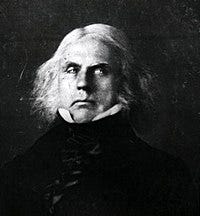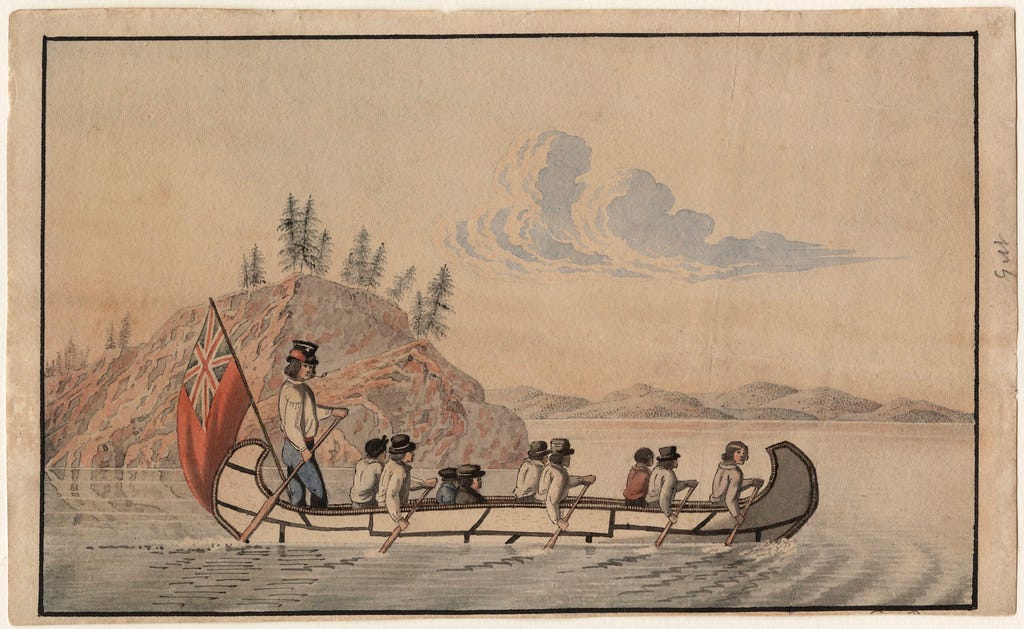Kevin Frazier: Oregon needs a new dad
History in a vacuum isn’t history — it’s an attempt to rewrite the past to fit the preferences of the present.
Kevin Frazier does his best to edit The Oregon Way while “attending” the UC Berkeley School of Law. He is splitting his time between SF and Oregon. He apologizes for this post going out a day earlier than intended…
If you haven’t had a chance to read David Frank’s post, please consider doing so before digging into this one!
We can recognize the past AND celebrate role model Oregonians

There's no disputing that Oregonians should learn about Dr. John McLoughlin's role in transforming Oregon from a territory to a state. But it's worth questioning whether he ought to be recognized as Oregon's father, a formal title bestowed to him by the Oregon State Legislature in 1957.
Count me among the Oregonians looking for a better father figure.
As the “Chief Factor” of the Hudson’s Bay Company, McLoughlin was instructed to "monopolize the fur trade, keep peace with Indian tribes, and discourage agricultural settlement in the region," according to the Oregon Blue Book. Eventually, he realized that his latter charge was impossible—the influx of settlers in the Oregon Territory forced McLoughlin to change his tactics:
he started a general store in Oregon City that supplied new Oregonians with crucial provisions after an arduous journey;
he managed to help launch the area’s first distillery; and,
he welcomed Catholic missionaries to the territory.
When viewed in a vacuum, none of these activities seem particularly problematic. But history in a vacuum isn’t history—it’s an attempt to rewrite the past to fit the preferences of the present. Consideration for the impact of McLoughlin’s activities on the original settlers of Oregon quickly provides the necessary context to see that Oregon deserves a better father.
It’s true that, when compared to others, McLoughlin was relatively kind to Oregon’s indigenous communities (though relative to terrible is terrible). His moments of positive treatment, for example, earned him the nickname “White Headed Eagle.” Nevertheless, McLoughlin was described by a colleague as "a man of strict honor and integrity…ungovernable violent temper and turbulent disposition." His temper was shared by many of his fellow traders, who had no problem killing their competitors (as evidenced by the murder of twenty three men in cold blood—men who were a part of a rival trading company). For a long time, Dr. John, as many called him, did not exercise that temper toward members of the tribes of the northwest. The doctor "treated their diseases with extract of dogwood root, labored night and day through their plague of 1829...[and welcomed everyone, Indian or white,] under his sprawling roof."
Still, his steadfast pursuit of economic dominance directly led to the decimation of the way of life of Oregon's indigenous peoples. McLoughlin was "constantly expanding his domain." As he power grew, so did his tyrannical tendencies: "His word was law. No one in his great dining hall ventured to interrupt his oracular pronouncements on business, politics, philosophy, religion and the virtues of Napoleon Bonaparte."
His thirst for power soon erased whatever positives could be identified in his relationship with Oregon's first settlers. When members of the Klallam tribe killed fives of McLoughlin's traders, he did not respond with the "peace" he was supposed to maintain. Instead, he "punished them by destroying their village and massacring twenty-five inhabitants." His deplorable treatment of the Klallam manifested in more subtle, but similarly problematic ways. For instance, he used tribes as pawns—mandating that they refrain from trading with his enemies, thereby bankrupting his competitors. Though not all claims of mistreat of Indians by McLoughlin are true —for instance, a report to the government that McLoughlin enforced slavery among the Indians was created by a rival to undermine McLoughlin—his behavior unquestionably fell short of deserving “fatherly” recognition.
By the end of his life, once his economic power had ceded and political influence had diminished, McLoughlin revealed his true nature. In his last testament, he complained about being represented as "a traitor" while touting his work to save "American citizens...from the Indian tomahawk."
What role should McLoughlin play in Oregon’s history

It’s a question that cannot be fully answered in a blog post. Yes, McLoughlin saved many Indians; he also murdered dozens, if not more. Yes, McLoughlin provided settlers with free provisions so that they could survive their first winter in Oregon; but, he likely did so primarily to retain power. Yes, McLoughlin set many events in motion that led to its statehood; but, many others similarly did so.
Resolving these tensions is beyond the scope of this post. The Dunn Test suggests McLoughlin ought to remain a core character in the retelling of Oregon’s history, but he does not deserve a hero’s treatment. Regardless of the test applied and the outcome of that test, I believe what’s settled is that the State Legislature could come up with a better formal father for the state.
How does McLoughlin fare on the Dunn Test?
As Professor David Frank pointed out in his post yesterday, the University of Oregon applied the following test when considering whether to rename certain dorm buildings that bore the names of Frederick Dunn and Matthew Deady:
They weighed two factors to decide if the halls should be renamed: evidence of racist behavior and redemptive action suggesting an eventual renunciation of racism.
In the case of McLoughlin, there’s clear evidence of racist behavior. Whether his supposed generosity to settlers and willingness to treat indigenous Oregonians for illnesses outweighed his egregious behavior can be fairly easily dealt with:
1) A full review of the historical record makes clear that McLoughlin’s generosity was likely more grounded in advancing his commercial interests more so than meeting the needs of settlers.
2) Even if we assume that McLoughlin had the best intentions when providing new Oregonians with care, he still ordered the murder of members of the Klallam tribe (and this came after having given other indigenous peoples medical care).
3) The upshot is that McLoughlin appeared to prioritize profit over other people and blatantly stepped beyond the bounds of the law and any notion of fair combat (even one decides to call it that) when, in 1828, he facilitated murder long after an initial attack had been completed.
So, who would you nominate for Father of Oregon?
No father is without flaws, but it’s time for a dad that all Oregonians can aspire to emulate. Oregon deserves a father who evidences some key traits:
an ability to learn from mistakes
a commitment to treating others with respect, and
a deep reverence for Oregon as a place
Who personifies these traits? What other criteria would you add?
Some potential contenders:
***************************************
Keep the conversation going: Facebook (facebook.com/oregonway), Twitter (@the_oregon_way)
#55



